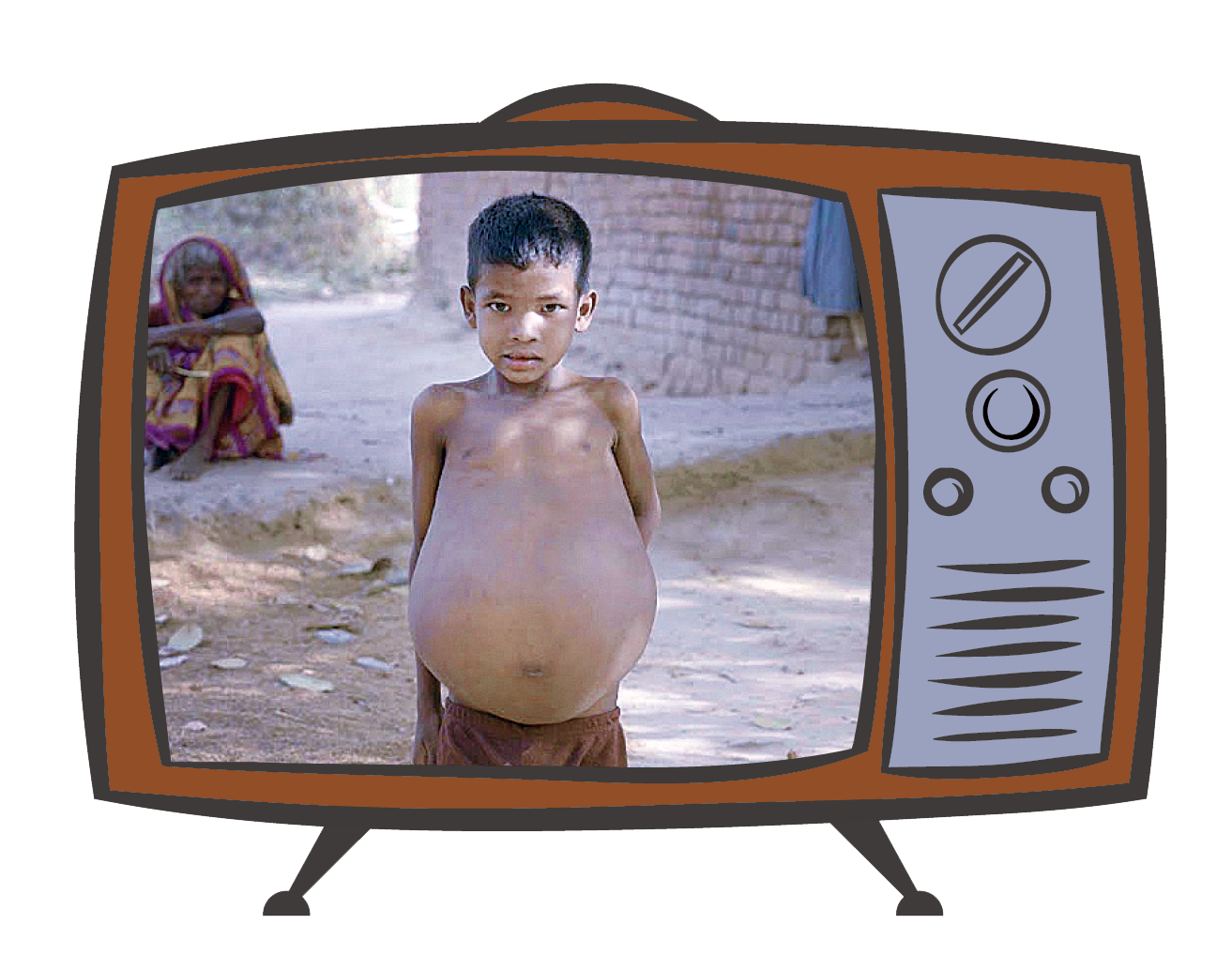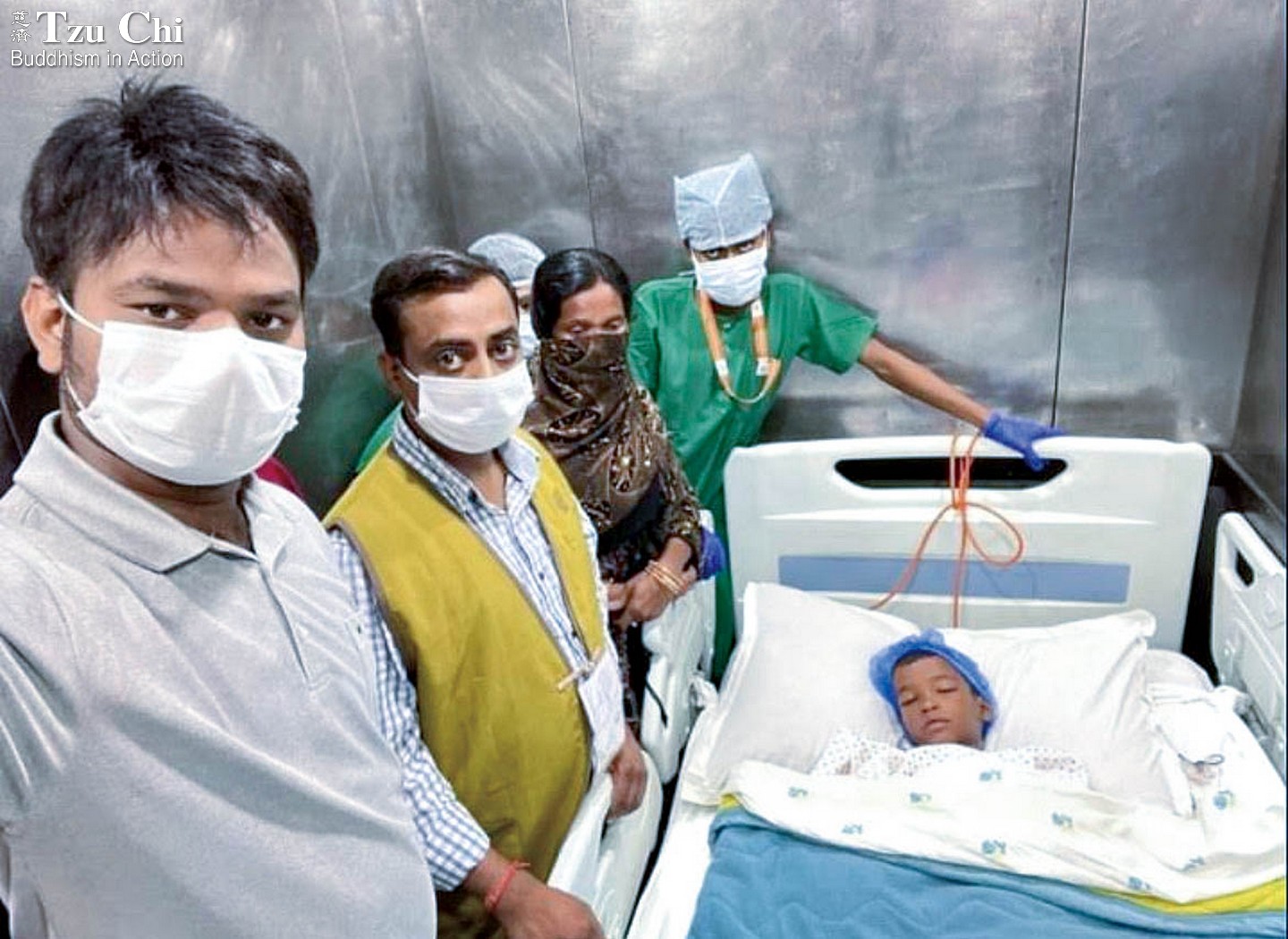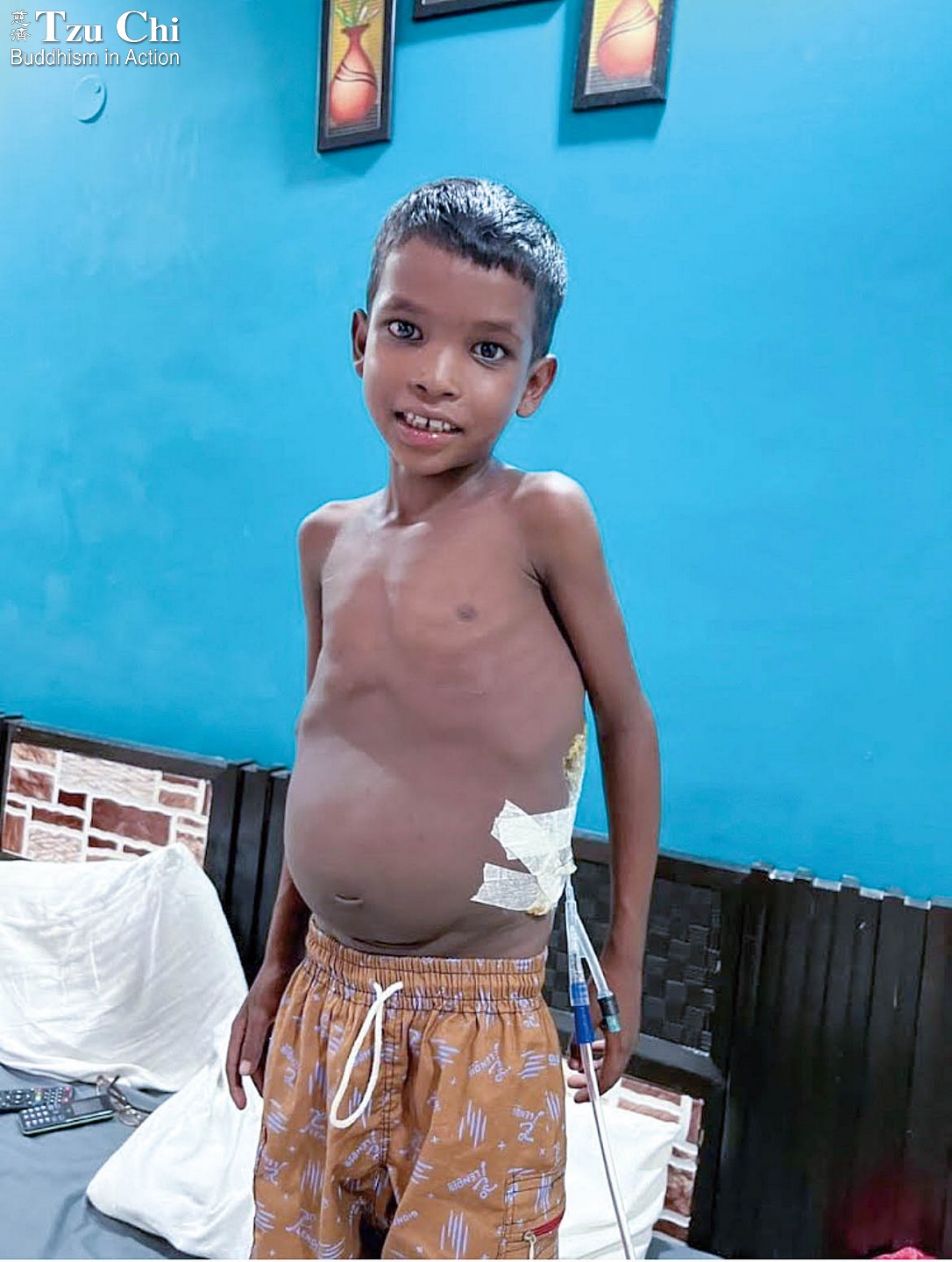By Zeng Qian-yu, Yuan Shu-zhen, and Wu Xiu-ling
Translated by Wu Hsiao-ting
Photos courtesy of Tzu Chi Hualien headquarters
A little boy in India with an unusually large abdomen appeared accidentally on footage filmed for an upcoming Tzu Chi musical sutra adaptation. The sight stirred the compassion of Dharma Master Cheng Yen, thus beginning an incredible journey to find the boy and help him obtain treatment.
A Tzu Chi team in Taiwan is producing a musical sutra adaptation to promote the Buddha’s teachings, scheduled to be staged in Taiwan at the end of this year. In order to make the production as good as possible, the team arranged to have video footage taken of locations that were significant in the Buddha’s life to show on stage. These included Rajgir, one of the Enlightened One’s most important preaching locations. On June 12 this year, the team reported on the progress of the production to Dharma Master Cheng Yen, showing her the video footage that had been captured. One of the shots they presented had unintentionally showed a thin little boy with an unusually large abdomen. He was obviously suffering from some kind of disease. Seeing the boy stirred the Master’s compassion. She even mentioned him for two days in a row in her Dharma talks, which showed how worried and concerned she was about him. “Let’s go look for him,” said the Master.
Thus began a mission to find the boy in the video and help him get treatment. But finding him in the second most populous country in the world, 91 times the size of Taiwan, would be like looking for a needle in a haystack. To begin, staffers at Tzu Chi headquarters in Taiwan contacted the company in India that had helped capture the aerial footage. With their help, they learned the name of the village in which the boy might be living. With that information, they had a chance of tracking him down.
But even with the name of a village, how could the boy be located? After all, India is 4,200 kilometers (2,610 miles) from Taiwan. It was then they remembered Abhishek Kumar, a new Tzu Chi volunteer who lives in Rajgir and works as a Chinese language tour guide. He might be able to serve as Tzu Chi’s eyes and ears in India to find the youngster. When asked if he could help, he readily agreed to do his best to find the boy.
Abhishek set off to look for the boy at 9:30 on the morning of June 14, the day after he received the request to help locate him. All that he had to help him find the boy was the name of the village, some photos, and the footage in which the youngster was seen. Driving a motor scooter, braving a scorching sun and temperatures up to 48 degrees Celsius (118 degrees Fahrenheit), Abhishek traveled through village after village to track down the mystery boy.
At five in the evening, just as the sun was about to set, Abhishek saw a large banyan tree that had appeared in the video. He walked down a trail next to the tree and began asking villagers in the area if they knew of the boy. Based on their directions, he found the boy just before dusk fell. He immediately contacted Tzu Chi volunteers in Taiwan via video chat to tell them of his good news. He was so excited, his eyes sparkling with joy, he had forgotten all about his fatigue.

Sandeep’s image, with his swollen abdomen, was captured by accident on footage filmed for an upcoming Tzu Chi musical sutra adaptation.
Meeting the boy
The boy’s name is Sandeep Kumar. He’s nine and has seven siblings. His 18-year-old brother is already married with two children. Sandeep lives with nine other family members in a brick house in Badrepool, a typical rural village in India. Though there are ten of them living together, there is only one bed in their home. When Abhishek arrived, Sandeep’s mother was chopping something that looked like rice stalks outside the house to feed the family’s livestock.
Via video chat, Tzu Chi volunteers in Taiwan told the mother about the care and concern Master Cheng Yen and Tzu Chi felt about her son. The mother was happily surprised and replied with hope in her voice: “I’m very thankful to Tzu Chi. It’d be great if my boy could receive treatment and even get a chance to go to school.”
Abhishek himself was deeply moved by the selfless Great Love that had traveled across seas to reach a little boy in his country. He could tell that the family in front of him was poor, so he immediately went to buy some food for them. He brought back 25 kilograms (55 pounds) of rice, ten kilograms (22 pounds) of flour, five kilograms (11 pounds) of potatoes, a liter of cooking oil, and an assortment of spices, biscuits, and chocolate.
To help Sandeep obtain treatment, Abhishek enlisted the help of Vivek Kumar. Vivek is another Tzu Chi volunteer in India and lives in Bodhgaya, where the Buddha is said to have attained enlightenment. The two men first met each other in 2013, when they were both learning Chinese in New Delhi, India’s capital. Their paths crossed again nine years later because of Tzu Chi. They now live 70 kilometers (43 miles), or about three hours, apart. Accompanied by Vivek, Abhishek visited Sandeep and his family again on June 16 to discuss how to arrange for medical attention for the boy.
Before setting out to meet Sandeep for the first time, Vivek thoughtfully prepared some gifts for the boy, including stationery and new clothes. Considering the boy’s extended belly, he had chosen larger size clothes so that they would fit Sandeep.
Sandeep rarely wore new garments, but he didn’t look particularly happy when he put on the new clothes. There was no smile on his face. It was probably because he had long felt he was different from others. The ridicule he had suffered from others had worn away the innocence other children possessed. His eyes had an indifference and vacuity in them that was heartbreaking to behold.
In fact, Sandeep’s parents had taken him to the doctor before, five years ago. They had visited a hospital in Patna, Bihar, and even brought back the X-ray film taken of the boy and his ultrasound test results. But because the family couldn’t afford the treatment and because the doctor had told them the surgery would be risky, they made the decision to forgo treatment.
Sandeep’s medical history was forwarded to Dr. Chao You-chen (趙有誠), the superintendent of Taipei Tzu Chi Hospital in northern Taiwan. He judged that the boy’s extended abdomen wasn’t a result of roundworm infestation or ascites (the buildup of fluid in the abdomen most commonly caused by cirrhosis of the liver), but rather was linked to a urological condition. The case was passed on to Deputy Superintendent Yang Shei-Dei (楊緒棣), an expert in pediatric urology. Dr. Yang immediately contacted physicians in Kolkata (formerly Calcutta) and New Delhi and conferred with them online about possible treatments for Sandeep.

Sandeep is about to be delivered to the intensive care unit for observation after the surgery to drain fluid from his abdomen was completed.
A 20-hour journey into the unknown
Since Sandeep’s medical records were five years old, the doctors decided that the boy should be examined again to obtain the most updated information about his condition. On June 23, Abhishek accompanied Sandeep and his parents to Bodhgaya, where they met up with Vivek and took the boy to a hospital for an examination.
The next day, as soon as Vivek obtained the X-ray film, he reported back to the Tzu Chi doctors in Taiwan. After reviewing the test results, Superintendent Chao concluded that Sandeep’s condition was one of those extreme cases where an illness was allowed to deteriorate to a point beyond imagination due to lack of medical intervention. “If the boy came to Taiwan,” the doctor added, “he would receive very good care. But we need to put ourselves in his shoes: he has rarely even stepped outside of his own village.” All things considered, the superintendent felt it’d be best for Sandeep to receive medical care in India.
He suggested a direction for the boy’s treatment. “His right kidney can still function normally. If given proper treatment, he still has a chance to grow up properly. We will need further information on the left kidney to decide how to take care of it. I suggest taking the boy to senior physician Dr. Sujit Chowdhary in New Delhi to have the fluid drained from the boy’s abdomen before we assess further treatment options.”
New Delhi is 1,100 kilometers (684 miles) from Sandeep’s village. On July 18, Abhishek accompanied the boy and his parents from a bus stop near their home to Rajgir. There they boarded a train, and after a three-hour ride arrived at Gaya railway station, where they met up with Vivek. The real challenge was the trip from Gaya to New Delhi. July and August are the hardest times of the year to get a train ticket. Vivek had to bend over backwards to secure tickets for the five of them. The tickets he managed to purchase were for a train that got them to New Delhi in the shortest time, but even so it still took 12 hours. After arriving in New Delhi, they had to travel yet another hour to get to the hospital. The entire trip lasted 20 hours.
Sandeep and his parents had never traveled far from their home, so this trip was a brand-new experience for them. When the five of them boarded the train bound for New Delhi, Vivek considerately helped the family get their beds in the sleeper car ready. The parents, who were shy, and Sandeep, who was quiet, soon fell asleep, apparently wiped out from the journey so far.
When day came, they converted their beds into seats. Abhishek wore a smile throughout it all and saw to it that everyone had their meals. He has two young children at home, so he empathized with what Sandeep’s parents must have been feeling about their son.
It wasn’t an easy trip. The weather was so warm that everyone perspired profusely on the train. The couple remained silent most of the time. For the sake of their son’s future, they could not be afraid. They had to take the chance that had come their way and march forward bravely into the unknown.

After surgery, Sandeep’s girth was reduced from 72 centimeters to 59. Assessments of his renal function remain to be made.
Surgery
Sandeep and his parents met with Dr. Sujit Chowdhary at Indraprastha Apollo Hospital. “Why did you wait until now to seek treatment for your child?” the doctor asked, stunned by the sight of the child with an abdomen as big as a large watermelon. “He should have received treatment long ago!” It was only then that Sandeep’s mother realized her son’s condition was so dire and required immediate care. It made her appreciate even more Tzu Chi’s efforts to find them and help Sandeep get treatment. It was a race against time.
Vivek took care of the procedures required for the boy to have surgery, while Abhishek tended to the needs of the family. Because Sandeep was still so young, his mother was allowed into the operating room while he had the surgery to drain the urine from his abdomen. The operation took an hour, after which Sandeep was transferred to the intensive care unit for observation. His abdomen was already looking a lot smaller.
It is hard to imagine how he got through every day with his abdomen so full of urine. Seven liters of fluid were drained from his abdomen during the surgery, with more flowing out in the days following the operation. The boy’s girth gradually shrank from 72 centimeters to 59 centimeters (28 inches to 23 inches). Dr. Chowdhary said that he would need to be observed for four to six weeks before assessing his renal functions.
When Sandeep had improved enough after the surgery, he was discharged from the hospital and was staying in a local hotel. Things seemed to be going well, but then something shocking happened. Instead of becoming flat, Sandeep’s abdomen caved in, as if a big hole had appeared there. Vivek immediately contacted Taiwan. Superintendent Chao explained that it was because the organs in Sandeep’s abdomen had become misshapen after being compressed for so long, but the condition would gradually improve. Just as the doctor said, the boy’s abdomen began to look more normal soon afterwards—even the overstretched skin was on the mend.
“Keep his legs raised to see if we can get more urine out,” the superintendent instructed via the Internet. Following his directive, Vivek and Abhishek tried all kinds of postures with the boy in an attempt to drain more fluid. They didn’t even mind when urine leaked out from the drainage tube and splashed them as they worked to find the best position.
To help Superintendent Chao decide whether Sandeep could safely return home, Vivek found a medical testing lab to have an ultrasound test done on the boy. “Judging from the ultrasound report, the surgery to drain the fluid was a great success,” said the doctor. “Very little fluid was left in the abdomen. It’s okay for the boy to go home now.” Thus assured, Vivek and Abhishek began arranging for the trip to accompany the family home.
When Sandeep arrived at home on July 24, his neighbors came to check on him. Surprise and happiness were written all over everyone’s face. “We were doubtful in the beginning, but now we know all this is true,” a neighbor said. “We can’t believe he has really recovered.”
“I wouldn’t have been able to save my own child if you hadn’t sought us out,” said the father, who had been quiet throughout the journey. Now finally home, he was unable to contain his excitement and he voiced his gratitude. Even Sandeep’s grandparents had rushed over to see their grandson. Holding Abhishek’s hands warmly in theirs, they said: “Many thanks to the esteemed Master Cheng Yen. Many thanks for changing our boy’s life.”
“I wouldn’t have been able to pull this off without Vivek’s help,” said Abhishek. He was grateful to Vivek for helping him and the family through the ordeal. Vivek responded by saying: “None of us had ever come across anything like this. We were scared. Fortunately, Abhishek was on hand all the time to help take care of the boy.”
What has happened to Sandeep was nothing short of a miracle. It could not have happened without dedicated individuals in Taiwan and India doing their best to bring relief to this little boy. The story of love continues, showing that no distance, no ethnic differences, and no borders can dampen the spirit of Great Love.



